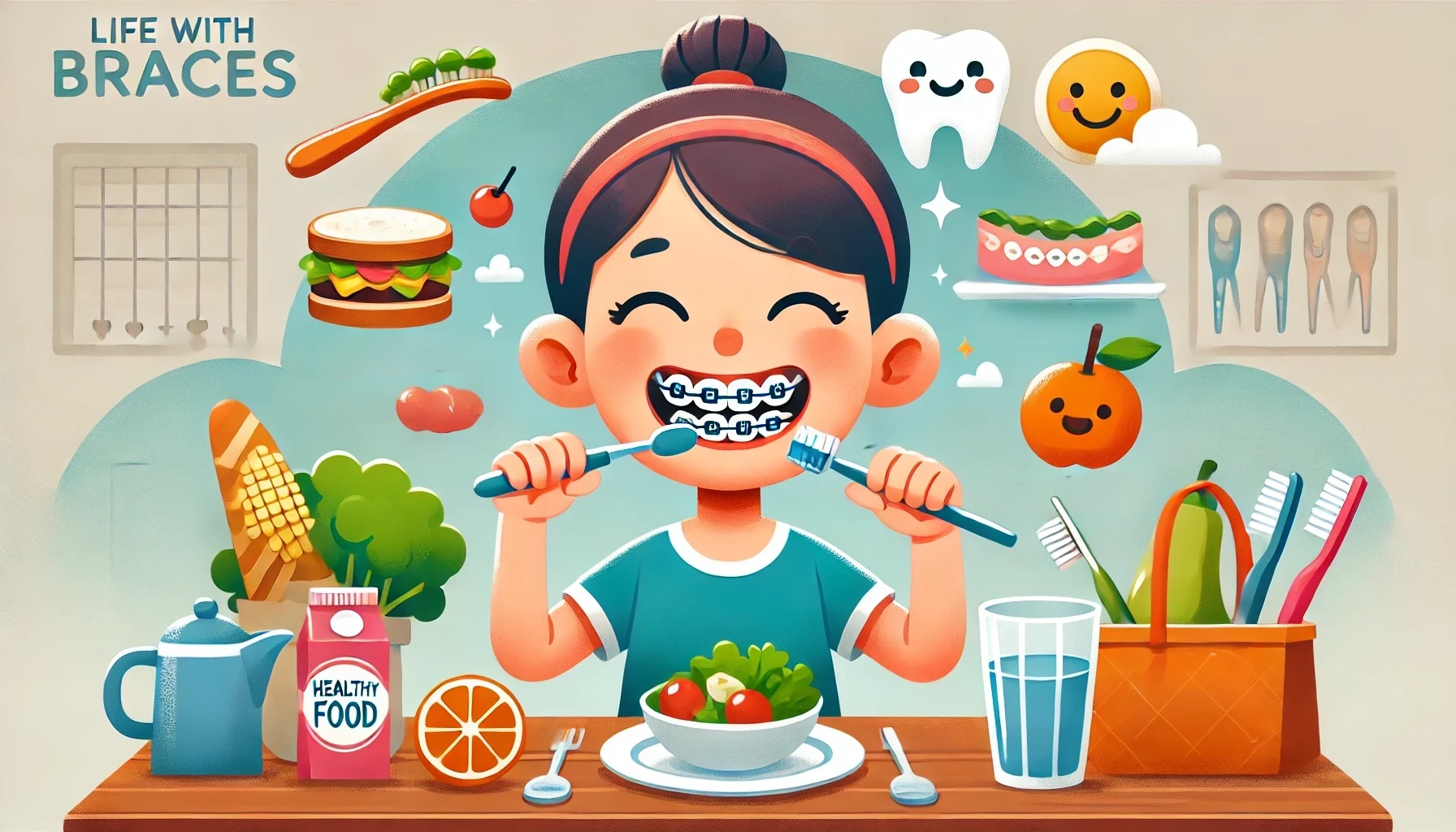
Wearing braces is a significant step toward achieving a beautiful, straight smile, but it also brings some changes to your daily routine. Adjusting to life with braces involves learning new ways to eat, speak, and maintain oral hygiene. At Quartz Dental, located at 9 Duchess Walk, London SE1 2SD, we are here to guide you through this journey. Here are some essential tips for making life with braces more comfortable and effective.
Adjusting your eating habits is crucial to protect your braces and ensure your treatment progresses smoothly. Here’s how you can enjoy your meals while wearing braces:
Adjusting your eating habits is crucial to protect your braces and ensure your treatment progresses smoothly. Here’s how you can enjoy your meals while wearing braces:
Foods to Avoid
Certain foods can damage your braces, so it’s best to avoid them:
・Sticky Foods: Caramel, chewing gum, and other sticky candies can get stuck in your braces and are difficult to remove.
・Hard Foods: Nuts, popcorn, hard candies, and ice can break or bend your braces.
・Chewy Foods: Foods like bagels, hard rolls, and tough meats can be hard on your braces and difficult to chew.
・Crunchy Foods: Raw carrots, apples, and corn on the cob should be avoided unless cut into small, manageable pieces.
Foods to Enjoy
There are plenty of braces-friendly foods you can enjoy:
・Soft Fruits: Bananas, berries, and citrus fruits are easy to eat and won’t harm your braces.
・Dairy Products: Yogurt, cheese, and milk are great options that provide essential nutrients for strong teeth.
・Cooked Vegetables: Steamed or roasted vegetables are soft and easy to chew.
・Soft Proteins: Eggs, tofu, fish, and tender cuts of meat are good sources of protein and easy to eat with braces.
・Grains: Pasta, rice, and soft bread are braces-friendly and provide necessary carbohydrates.
Eating Tips
・Cut Food into Small Pieces: Make food easier to chew and reduce the risk of damaging your braces by cutting it into smaller pieces.
・Chew Carefully: Chew slowly and gently to avoid putting too much pressure on your braces.
・Drink Plenty of Water: Drinking water helps wash away food particles and keeps your mouth clean.
It’s normal to experience some difficulty speaking clearly when you first get braces. Your mouth needs time to adjust to the new appliances. Here are some tips to help you speak more comfortably:
Practice Speaking
・Read Aloud: Practise speaking by reading books or articles aloud. This helps your mouth adjust to the braces and improves your speech.
・Tongue Exercises: Move your tongue around to different positions in your mouth to get used to the braces. This can help improve your articulation.
・Speak Slowly: Take your time when speaking to enunciate words clearly. This will help you become more comfortable with your braces.
Manage Discomfort
・Orthodontic Wax: If your braces are causing irritation to your cheeks or lips, use orthodontic wax to cover the brackets. This will reduce friction and make speaking more comfortable.
・Hydration: Keep your mouth hydrated to prevent dryness, which can make it harder to speak clearly.
Maintaining excellent oral hygiene is critical when you have braces. Food particles and plaque can be trapped by braces, raising the risk of gum disease and cavities. Here are some cleaning tips for your braces and teeth:
Brushing
・Brush After Every Meal: Brush your teeth after every meal to remove food particles and plaque.
・Use a Soft-Bristled Toothbrush: A soft-bristled toothbrush or an orthodontic toothbrush designed for braces can help clean around brackets and wires effectively.
・Fluoride Toothpaste: Use fluoride toothpaste to strengthen your enamel and protect against cavities.
・Proper Technique: Gently move your toothbrush in circular strokes while holding it at a 45-degree angle to your gum line. Brush every tooth between the gums, above the brackets, and below them.
Flossing
・Floss Threaders: Use floss threaders to guide dental floss under the wires and between your teeth. This helps remove plaque and food particles from areas that a toothbrush can’t reach.
・Orthodontic Floss: Special orthodontic floss with a stiff end can make it easier to thread the floss under braces.
Interdental Brushes
・Interdental Brushes: These small, cone-shaped brushes can clean between braces and under wires, removing food particles and plaque from hard-to-reach areas.
Mouthwash
・Antibacterial Mouthwash: Rinsing with an antibacterial mouthwash can help reduce plaque buildup and prevent gum disease.
・Fluoride Mouthwash: A fluoride mouthwash can strengthen tooth enamel and help prevent cavities.
It’s common to experience some discomfort when you first get braces or after adjustments. Here are some tips to manage the discomfort:
・Orthodontic Wax: Apply orthodontic wax to brackets and wires that are causing irritation to your cheeks or lips.
・Saltwater Rinse: Rinse your mouth with warm salt water to soothe sore spots and reduce inflammation.
・Over-the-Counter Pain Relief: Use over-the-counter analgesics like acetaminophen or ibuprofen to relieve pain if necessary.
Life with braces involves some adjustments, but with the right tips and practices, you can maintain good oral hygiene, eat comfortably, and speak clearly. At Quartz Dental, we are committed to helping you achieve a beautiful, healthy smile through comprehensive orthodontic care and guidance.
For more information or to schedule a consultation, visit our website at Quartz Dental, call us at +44 20 3973 9337, or visit us at 9 Duchess Walk, London SE1 2SD, United Kingdom. Our clinic, conveniently located near London Bridge and Tower Bridge, is here to support you throughout your orthodontic journey.